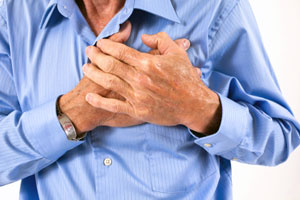Having too much body
fat makes arteries become stiff after middle age, a new study has revealed.
In young people, blood vessels appear to be able to
compensate for the effects of obesity. But after middle age, this adaptability
is lost, and arteries become progressively stiffer as body fat rises -
potentially increasing the risk of dying from cardiovascular disease.
The researchers suggest that the harmful effects of body fat
may be related to the total number of years that a person is overweight in
adulthood. Further research is needed to find out when the effects of obesity
lead to irreversible damage to the heart and arteries, they said.
Obesity is known to be a major risk factor for heart
disease, but the reasons for this are not fully understood.
Researchers at the Medical Research Council (MRC) Clinical
Sciences Centre at Imperial College London scanned 200 volunteers to measure
the speed of blood flow in the aorta, the biggest artery in the body. Blood
travels more quickly in stiff vessels than in healthy elastic vessels, so this
allowed them to work out how stiff the walls of the aorta were using an MRI
scanner.
Body fat percentage, which can be estimated by passing a small
electric current through the body, was more closely linked with artery
stiffness than body mass index, which is based just on weight and height. Men
are on average about 21% fat and women 31% fat.
Dr Declan O'Regan, who led the study, said: "The
effects of having more fat seem to be different depending on your age. It looks
like young people may be able to adapt to excess body fat, but by middle age
the cumulative exposure to years of obesity may start to cause permanent damage
to the arteries. One implication is that the potential beneficial effects of
weight loss may depend on your age and how long you have been overweight. This
is something we plan to study further.
Certain metabolic products in the blood may progressively
damage the elastic fibres in our blood vessels. Understanding these processes
might help us to prevent the harmful effects of obesity.
###
The research has been published
online in Hypertension, the scientific
journal of the American Heart Association:
Corden B, Keenan NG, de Marvao ASM, Dawes TJW, DeCesare A, Diamond
T, Durighel G, Hughes AD, Cook SA, O'Regan DP.
Body Fat Is Associated With Reduced Aortic Stiffness Until Middle Age.
Hypertension, 2013; DOI:
10.1161/HYPERTENSIONAHA.113.01177
The Omron HBF-306C measures body fat with a micro electrical
current.
Muscles, blood vessels and bones are body tissues having a
high water content that conduct electricity easily. Body fat is tissue that has
little electric conductivity. The Body Fat Analyzer sends an extremely weak
electrical current of 50 kHz and 500 µA through your body to determine the
amount of fat tissue. This weak electrical current is not felt while operating
the Body Fat Analyzer. The Bioelectrical Impedance Method safely combines the
electric resistance with the distance of the electricity conducted. Correct
posture and consistent measuring conditions need to be maintained for the best
results.


